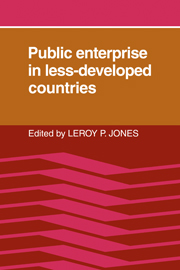Book contents
- Frontmatter
- Contents
- List of contributors
- List of figures and tables
- Preface
- 1 Introduction
- Part I Why public enterprise?
- Part II Principal-agent relationships: Who should control public enterprises?
- Part III How are decisions made in practice?
- Part IV How do public enterprises behave in international markets?
- Part V How does risk alter public-enterprise decisions?
- Part VI How are incentive structures to be designed?
- 14 Performance indices for public enterprises
- 15 Public enterprise versus regulation when costs are uncertain
- Part VII How does public enterprise compare with other intervention mechanisms in overcoming particular problems?
14 - Performance indices for public enterprises
Published online by Cambridge University Press: 04 August 2010
- Frontmatter
- Contents
- List of contributors
- List of figures and tables
- Preface
- 1 Introduction
- Part I Why public enterprise?
- Part II Principal-agent relationships: Who should control public enterprises?
- Part III How are decisions made in practice?
- Part IV How do public enterprises behave in international markets?
- Part V How does risk alter public-enterprise decisions?
- Part VI How are incentive structures to be designed?
- 14 Performance indices for public enterprises
- 15 Public enterprise versus regulation when costs are uncertain
- Part VII How does public enterprise compare with other intervention mechanisms in overcoming particular problems?
Summary
Alternative devices for efficient pricing in multiproduct monopoly situations
Two rules for the efficient pricing of monopoly firms have been widely discussed in the literature. The marginal-cost rule was the center of controversy in the 1940s and 1950s, and the Ramsey rule’ was the fashionable topic of the last decade. Both rules require substantial information for their implementation. Mainly because outside regulators lack such information, the marginal-cost rule has lost its popularity. Information to implement the Ramsey rule may be even harder to come by. However, as this chapter shows, the information requirement to implement both rules can be lowered substantially by setting appropriate performance indices for public-enterprise managers.
A combination of two features distinguishes the public enterprise from other economic institutions: (1) it is mainly financed by the revenues derived from the sale of its products in markets, which makes it differ from ordinary public administration, and (2) it differs from private capitalistic enterprises by virtue of public (state) ownership. This hybrid position of public enterprises gives rise to two natural starting points for a normative analysis. First, what can be gained by decentralizing part of the administration via public enterprises? Second, what advantages can public enterprises hold over private firms? If there are such advantages, they must have a restricted domain, because otherwise the hybrid would dominate its parents.
To be the superior institutional setup, public enterprises first have to be feasible. This is of major relevance for the decision to turn a government administration into a public enterprise. If the administration's output consists of pure public goods with no possibility to exclude, a public enterprise simply is not feasible.
- Type
- Chapter
- Information
- Public Enterprise in Less Developed Countries , pp. 281 - 296Publisher: Cambridge University PressPrint publication year: 1982
- 7
- Cited by



